Miuccia Prada: ‘Me and my husband, we never woke up thinking about making money’
Advertisement
People
Miuccia Prada: 'Me and my husband, we never woke up thinking about making money'
Instead, the billionaire fashion designer, along with her husband, Prada CEO Patrizio Bertelli, approached the company from a creative standpoint, which has served them well since the mid-1970s.
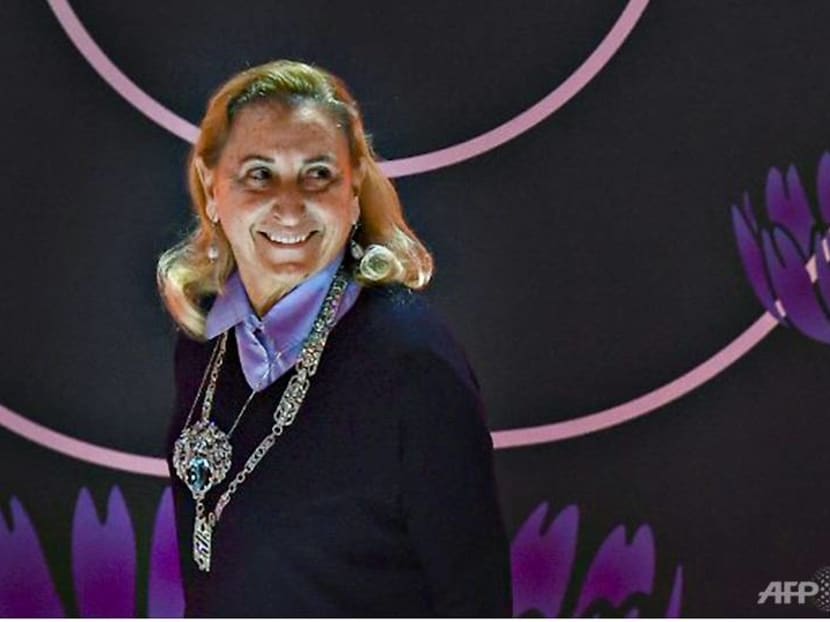
Italian manner designer and businesswoman, Miuccia Prada acknowledges applause post-obit the presentation of Prada'southward Women Fall/Wintertime 2022 fashion collection on February twenty, 2022 in Milan. (Photo: AFP/Miguel Medina)
Miuccia Prada is speaking over Zoom from Milan nigh the presentation of her final collection as Prada's sole creative director. Titled The Show That Never Happened, the drove – commonsensical, elegant, rigidly minimalist, with overt references to her first womenswear show in 1988 – was, because of COVID-nineteen, unveiled in a sequence of brusque films directed past artists including Martine Syms and Juergen Teller.
"At some point what you practise isn't yours whatsoever more only in the hands of others," she said.
Only in speaking of buying, Prada could take been referring to what is now happening at her family's leather-appurtenances business concern, which she took over in the mid-1970s and transformed, alongside husband and Prada chief executive Patrizio Bertelli, into a cultural force and style group with €3.2 billion (S$5.2 billion) in sales last yr.
In February 2020, on the weekend before Milan went into its kickoff lockdown, Prada and Belgian designer Raf Simons settled into a pair of plush swivel chairs at the company's via Bergamo headquarters and appear what many in the room already knew: That later on more 4 decades as Prada's artistic builder, she would now share that responsibility with Simons, the one-time creative director of Calvin Klein and Dior.
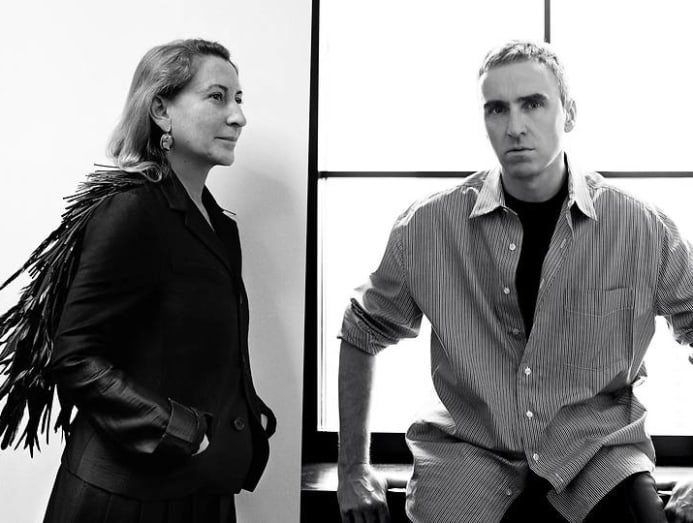
Such a movement was unprecedented: Never before had 2 such well-known and well-regarded figures shared the creative responsibilities of a major fashion label. Information technology was proof, once again, of Prada's prodigious capacity for change.
READ> Raf Simons's Prada debut questions the link between humans and technology
"It was about a moment of opening up. I was ever very. . . I don't desire to say independent but . . . I almost always said no [to collaborations]," she told me. "We joked in a [2016 joint] interview that it would be nice for designers who honey each other to piece of work together, and maybe to create a place for people who are serious, that respect each other, to gloat inventiveness against marketing."
For almost designers in that location is a bespeak – usually 5, sometimes ten years in – where new ideas neglect to bubble to the surface, where their work becomes self-referential, static, dated. That this has never happened to Prada has given her an well-nigh mythical condition. It is what makes her shows, season after season, so suspenseful: One never knows what will sally from behind the drape when the music starts.
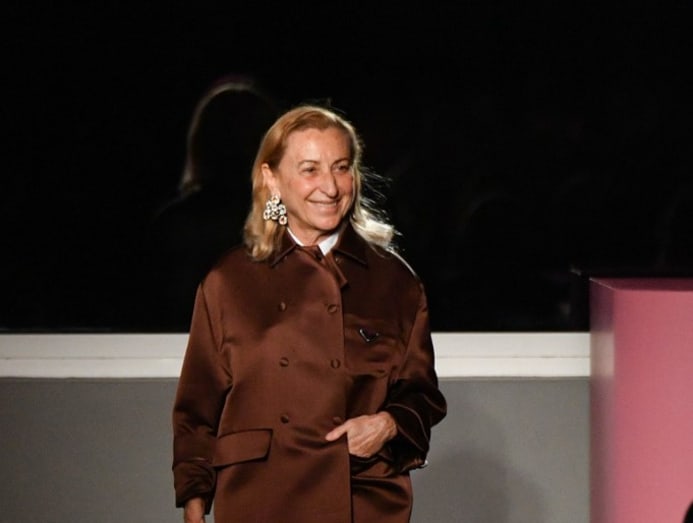
She has fabricated bad taste chic, spearheaded the appropriation of vintage designs in loftier fashion and, in her revolutionary employ of nylon, PVC or even bits of garbage such as crushed bottle tops and broken mirrors, exorcised preciousness out of luxury. In designing and dressing to delight herself, she has taught others to do the same.
"I get on thinking, proceed irresolute, go on facing the problem and the reality," she said, when asked why she thinks her work has kept pace with – and frequently steered – the zeitgeist. "I accept a personal need to know what is going on… I ever have this sense of not knowing enough."
RESISTING CLICHES
Prada's clothes are never straightforward. To wear them correctly is to vesture them tongue-in-cheek, though many don't. She is a firm believer that also much adept taste tin can ruin a drove, then she'll oft begin by exploring something she loathes, such as golf game or crochet, trying to twist it into something she likes. Cliches of femininity – bows, florals, baby-doll dresses – are frequent targets.
"Miuccia's irreverence was the quality that offset caught fashion's attention," said U.s.a. Faddy editor-in-master Anna Wintour. "She dared to ask the questions: What is beauty? What'due south good taste? All these years later on she continues to fascinate because she'southward notwithstanding challenging convention, withal resisting cliches."

It is deliciously ironic that one of the earth's nearly influential fashion designers doesn't sketch or sew. Instead, she surrounds herself with talented designers who translate her ideas into clothes, bags, shoes, jewellery.
Fabio Zambernardi, who joined Prada in 1989 and became design manager in 2002, has been by her side the longest. Some have gone on to lead their own brands, including Francesco Risso at Marni and Walter Chiapponi at Tod's. "Every time she said something, it opened your mind," Chiapponi gushed earlier this year.
Amidst her first tasks with Simons is defining what he calls the "ness" of "Prada-ness": A tallying-up of the things she likes. That is catchy for a designer who relies on instinct and tires of new ideas quickly. Information technology'south why she only gets dressed 10 minutes before she leaves the business firm and gives herself just ten days to pattern a collection.
"The pressure gives me more excitement, more than fear, and then my encephalon is more than quick," she explained. "If I call up also long, I get bored."
"Miuccia's irreverence was the quality that first caught way'southward attending. She dared to ask the questions: What is beauty? What'southward expert taste?" – Anna Wintour
AN Accidental VOCATION
Miuccia Bianchi Prada never intended to accept a career in fashion. A women'southward rights campaigner with a doctorate in political scientific discipline, she one time imagined a life in the theatre (she performed mime for five years). It was not until the mid-1970s that she reluctantly entered the leather appurtenances business started by her grandfather, Mario, in 1913.
"Being, allow'south say, a leftist feminist, to work in fashion was a nightmare," she said, peering into the camera. I can glimpse a ruby-and-white gingham shirt nether a V-neck navy jumper and a pair of antiquarian drop earrings – her "uniform" of the moment – against a room wallpapered in mossy green velvet.
"I hated the idea. I felt and so insecure, so guilty, because I was doing a chore that was in my mind, dorsum then, confronting my ideas."
At a trade off-white in 1977, Prada met a immature leather factory owner who would become her futurity hubby. Described as brash and mayhap a bear on overconfident, the immature Bertelli had big ideas for her business concern and snapped up the exclusive licence to industry and distribute Prada's leather appurtenances.
"Without him, probably I would not accept gotten into this job at all," Prada said. "I saw with him a new world of possibilities; we were working together and also staying together." They still live in the aforementioned Milan apartment she grew up in, where they accept raised two sons.
The early years of their human relationship have been described as "volcanic". Does she like it when he offers opinions of her piece of work? "I'm used to it," she laughed. "I think that working together helps marriages. If you build something in life, it'south a way of staying together."
In 1984, Prada introduced her quantum design: A blackness, lightweight, minimally branded backpack in armed forces-grade nylon. Such a fabric – plain, industrial, but in fact more expensive than leather – defied the long-held conventionalities that luxury must exist precious and timeless, something that would become a life-long theme in her piece of work. Already, she was attuned to the minimalism that would sweep the design world in the ensuing decade.
It was non until February 1988, at the age of 39, that Prada presented her start womenswear collection, irreverently dubbing her discreetly luxurious clothes every bit "uniforms for the slightly disenfranchised". Their clean lines and mostly muted palette (blackness, brown, gray) were a tonic to the loud, lavish, frou-frou dress then toasted on the catwalks in Paris and Milan.
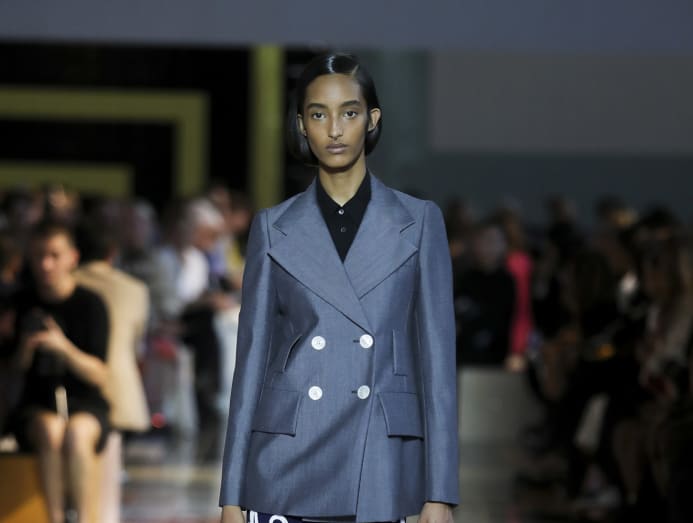
Prada began to button the edges of the austere, mannishly tailored garments of her early collections, introducing colours and designs that led critics to question her taste: Cowhide dresses and hot pants, bra tops and miniskirts stitched with seashells, dresses and tunics garlanded with large, floppy roses.
Certain designs became signatures. Whereas most women dress to draw the eye upward – with jewellery, collars or lipstick – Prada tends to focus on the neglected lower half. Her speciality has been the skirt – prim and pencil-shaped, or cut longer into knife or car-wash pleats. Specific vintage silhouettes appear again and again, a manner for Prada to reference period attitudes towards women.
"If I have washed anything, information technology is to make ugly appealing," Prada once told the curator Andrew Bolton, adding that her piece of work was "concerned with destroying – or at to the lowest degree deconstructing – conventional ideas of beauty, of the generic appeal of the cute, glamorous, conservative women".
"If I accept done anything, it is to make ugly appealing." – Miuccia Prada
BOOM AND BUST… AND BOOM Again
Prada'due south contributions weren't merely stylistic; she was besides building a business. The 1990s and early 2000s marked a menstruum of vigorous expansion for Prada: It introduced a menswear line and a secondary womenswear characterization, Miu Miu, in 1993, then began snapping up other labels, such equally Helmut Lang, shoemakers Church'southward and Car Shoe, and Jil Sander (which Simons was hired to blueprint). Eyewear and fragrance were added to the shelves. Sales grew from about U.s.$400,000 in the late 1970s, according to Forbes, to €two.vi billion in 2011, when Prada held a buzzy initial public offering on the Hong Kong stock exchange.
Only by 2014, fissures were starting to show. For the first fourth dimension since its public list, Prada's profits fell. Analysts say the company had opened too many stores and had missed the shift to digital and the boom in designer trainers. Its shares lost near three-quarters of their value between September 2022 and January 2022 as the company pursued a turnaround. Sales returned to positive territory in 2018, and fifty-fifty with the bottom-line damage brought near by COVID-19, shares are upwards a quarter from the start of 2020.
"Me and my hubby, we never woke up in the morning thinking about making money," said Prada. "That is probably non appreciated by the financial community. But that is the truth. We always did things considering we liked it, nosotros idea information technology was interesting, and it worked.
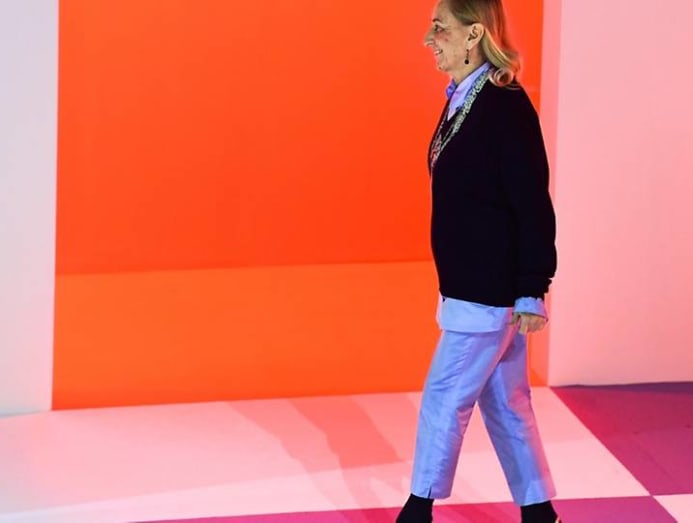
"Luxury at some point became well-nigh the i who sold more," she continued. "A lot of journalism doesn't care most the content, or the issue, or the attempt, or all the thoughts you put in your chore. You lot are mainly judged by how much money yous make."
She paused. "Even if you want to stay small, you can't because you lot disappear. Information technology'southward a machine that should exist broken."
In 2017, Prada's elderberry son Lorenzo joined the business later on spending almost of his twenties in the driver's seat of rally cars and is now tapped to become the group'south next main executive. Analysts speak warmly of the digital transformation he has ushered in at Prada, and his environmentally driven push to phase virgin nylon out of the company'southward supply chain in favour of recycled past 2021.
At 72, Prada is now five years by Italy's official retirement age. But although many take seen Simons' appointment every bit the outset step to an eventual succession, she has no plans to finish before long: "I like working. I'1000 here to work even more."
"Me and my hubby, we never woke up in the forenoon thinking nearly making coin. That is probably non appreciated by the financial customs. Merely that is the truth. We always did things because we liked it, we thought it was interesting, and it worked." – Miuccia Prada
By Lauren Indvik © 2022 The Financial Times
READ> It's all about quality: Why Rimowa's CEO doesn't like the word 'luxury'
Recent Searches
Trending Topics
Source: https://cnalifestyle.channelnewsasia.com/people/miuccia-prada-interview-258581

0 Response to "Miuccia Prada: ‘Me and my husband, we never woke up thinking about making money’"
Post a Comment